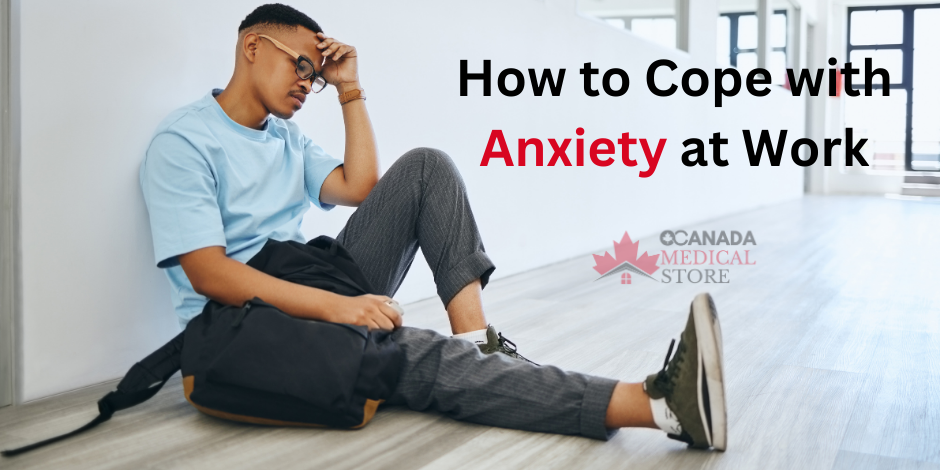Introduction
Are you someone who suffers from work anxiety or finds it hard to balance work, leaving you stressed? Work-related stress and anxiety can significantly impact your quality of life, leaving you eagerly awaiting the end of the workday.
Approximately three-quarters of people experiencing stress or anxiety report that it interferes with their daily activities, including their professional lives. Anxiety can impact work performance, work quality, relationships with co-workers, and relationships with supervisors. For those with a diagnosed anxiety disorder, these challenges may be even more pronounced.
What is work anxiety?
Work-related anxiety, also known as occupational stress, is a kind of anxiety that arises from and revolves around one’s employment. However, the experience and causes of work anxiety differ for people. For some, upcoming deadlines or upcoming presentations may trigger work anxiety, while for others, social dynamics at work, like a poor work culture or lack of connection with colleagues, may be the source. Larger concerns, like job security, organizational changes, or macroeconomic conditions, can also contribute to work anxiety.
However, the cause of work anxiety always depends upon the workspace you have. This type of work anxiety can have short-term and long-term effects, including reduced productivity, missed deadlines, career stagnation, and even job loss. Prolonged work stress can also lead to burnout and other far-reaching effects.
You can easily manage work anxiety by changing the type of your work environment. Also, work-related anxiety can seriously impact your future and relationship with others, so you must be active about your environment or change your toxic workplace.
Symptoms of work anxiety?
Working in a company that does not make you feel happy or satisfied is another level of stress, and if luckily you get employees with bad taste, it will become more stressful to work there.
Work anxiety can be difficult to recognize, but common symptoms include feeling irritable, struggling to start work, feeling overwhelmed by work notifications, missing deadlines, having trouble concentrating, worrying excessively about work, dreading going to work, experiencing physical symptoms like sleep issues, and overreacting to feedback or other work stressors.
These are some of the most common factors and symptoms that will indicate you are in the wrong place. Also, as soon as possible, change the place or make it better for you.
What causes workplace anxiety?
The sources of work-related anxiety are diverse and person-specific. Internal factors like imposter syndrome or self-imposed pressure can trigger work anxiety. Likewise, external factors such as workplace conflicts, heavy workloads, or market trends can also be the cause. Identifying the underlying reason for your work anxiety can help you address it.
Typical scenarios that may lead to work anxiety include:
- Because of external factors like fear of your job security.
- A poor work-life balance results in overwork and long hours.
- Lack of support and transparency from your manager.
- Unclear goals or expectations.
- Workplace conflicts, like bullying, teasing, or harassment,
- Lack of connection or isolation from co-workers,
- Unrealistic or to less deadlines or an unmanageable workload,
- Because of some upcoming projects or work commitments, you feel unprepared for
- Lacking a sense of purpose at work
You must know that work-related anxiety can be either temporary or persistent. Temporary anxiety can be easily triggered by specific circumstances, such as an impending presentation or closer deadlines. However, persistence can be caused by broader factors, such as organizational changes or macroeconomic conditions.
What are the effects of work anxiety?
The underlying reason is that work-related anxiety can have far-reaching outcomes that affect different aspects of your life, both within and outside the workplace. If you experience work anxiety, you may feel less self-assured in your role, hindering your ability to take on additional responsibilities or pursue growth opportunities. Furthermore, work anxiety can become a self-perpetuating cycle, where excessive worrying about missing deadlines ultimately leads to an inability to perform effectively at work, resulting in missed deadlines.
Also, there are some other consequences of work anxiety, which include:
- Lack of productivity,
- Reduced job performance,
- Career stagnation,
- Decreased self-assurance and the emergence of the imposter phenomenon,
- Reduced job satisfaction,
- Missed work deadlines,
- Impacted personal life and well-being,
Plan for work anxiety
The first step in managing work anxiety is to build a personal plan. If you are not getting proper sleep, eating quality healthy food, exercising, being involved in social activities, etc., then the chances of work anxiety are higher and can not be resolved if you do not change the habit.
Addressing workplace anxiety requires more than occasional mindfulness or yoga. It involves examining how you operate within the workplace system and interact with others. Avoiding your boss, gossiping with co-workers, or waiting until you’re overwhelmed with anger or tears to speak up can contribute to anxiety.
Here are some ways that will help you overcome work anxiety and make your office a better place for you.
Know everyone’s name:
If you have a good relationship with a maximum number of people in your office or know them by their names, it would be easy to tackle the issue. Also it will help you free from unnecessary gossiping as you can directly communicate with the person. Also, if you forget people’s names, you can easily ask them again without being embarrassed. Also, remember that it’s never too late to start something new or make any relationship in the office.
Ask for help
If your work seems to be hectic and all you have to say is yes, whether you understand the work or not, In such an uncomfortable situation, you can simply ask for help from someone instead of forcing yourself. It will decrease the pressure and overall anxiety about the work. Also, asking for help is the best way to communicate with your superiors and learn professional ways to solve the issue.
Avoid triangles
Many workplaces thrive on gossiping about co-workers or complaining about others, which may provide temporary relief or entertainment but only serve to build up tension and stress. This kind of negativity can be felt in the office environment. Bonding with someone by talking about a third person, known as a “triangle,” is an unhealthy way to manage work anxiety. Examples contain gossiping about a third person, talking or criticizing someone behind their back, and using them as a scapegoat.
Though it may be tempting to vent to a co-worker, it’s best to keep the issue between you and the person with whom you have conflict. While it might be difficult at first, you can reduce your anxiety by going to the people and having a conversation with them about the situation. Tell them you would like to reach a resolution and are motivated to create an open and honest workplace.
Set honest and clear deadlines.
In most cases, anxious people sometimes agree to the deadlines even if they know they cannot complete them. But as per my thoughts, it’s good to be honest upfront instead of apologizing later. We well know that not every deadline is negotiable, but they will save the hours that you are going to spend on being anxious. Also, if you can finish the task before the deadline, it will make you happier and less worried by building new confidence.
Use Neutral Language
Using clear and easy language at your workplace already makes your work so easy and less tiring. You must start the statement by beginning with “Here’s what I am thinking” and finish it with “What’s your opinion?” These will help people, and you have input and make them more likely to hear what you are saying. A clever communication is the easiest way to overcome so many problems, and if you have a toxic workplace, you must learn how to communicate.
Stay in contact
It’s normal human nature that if someone makes us uncomfortable or unwanted, we try to avoid the person or cut off contact with them. You may stop responding to emails you’re unsure how to address. You might avoid the break room after a dispute with a co-worker who bullies you. You may try to leave work early before your boss can ask you a question. One thing you must know is that the problem with avoidance is it’s just a temporary solution. See, it’s simple: if something triggers you and makes you feel anxious, you must not ignore it; you should talk about it and come up with a good conclusion instead of cutting contact with that person.
Engaging with others and addressing issues directly can reduce anxiety over time. Effective leaders can maintain connections with people who have diverse perspectives or work styles. Staying in touch can also help you decline additional responsibilities that lead to burnout and diminished job performance.
Do not drag others down.
In some cases, creating a scene can be entertaining for a specific time, but it ultimately makes the environment more stressful and lacks morality. If people around you try talking poorly of co-workers or for the boos, you just simply make an excuse and leave the room. Also, try not to respond to unwanted texts or emails that make others down. Remember, your words and actions do matter to others, and a small step can make someone’s day or may spoil it entirely.
Encourage
We know encouraging someone of your age is difficult, but trust me, this is the easiest way to keep your mind calm. Yes, in many cases of workspace anxiety, misinterpreting plays a vital role.
Conclusion
Remember one thing in life: if you are a working person, you have to go through different stages. No path is clear or without stones for you. All you need to do is to make yourself stable and mature enough to face the issues clearly. Also, your way of communication plays a vital role in it. Have healthy communication and clear words, and the results will always be in your favor.




